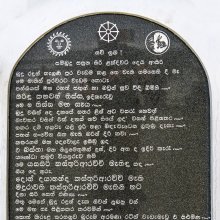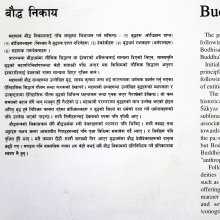Tira, Tīra, Tirā, Tiṟa: 20 definitions
Introduction:
Tira means something in Hinduism, Sanskrit, Buddhism, Pali, the history of ancient India, Marathi, Jainism, Prakrit, Hindi, biology, Tamil. If you want to know the exact meaning, history, etymology or English translation of this term then check out the descriptions on this page. Add your comment or reference to a book if you want to contribute to this summary article.
Alternative spellings of this word include Teer.
Images (photo gallery)
India history and geography
Source: archive.org: Personal and geographical names in the Gupta inscriptionsTīra (तीर) refers to a name-ending for place-names according to Pāṇini VI.1.135. Pāṇini also cautions his readers that the etymological meaning of place-names should not be held authoritative since the name should vanish when the people leave the place who gave their name to it.
Source: archive.org: Ceylon Branch of the Royal Asiatic Society 1963Tira or Tiragama is identified with Terigāma and represents an ancient village that existed since the ancient kingdom of Anurādhapura, Ceylon (Sri Lanka).—Near Kāsapabbata was the town Paṇa, also called Palonagara; this place is identical with Pajjotanagara which was named after Pajjota tank which Duṭṭhagāmaṇi built near Kāsapabbata. The Sīgiri Graffiti mention Polonaru. In an inscription of Vasabha (67-111) Palo-nakaraka tank in Tihalaka district and the assembly at Tiragama are mentioned. Aggabodhi II (604-614) built a Practising House at Palaṃnagara-vihāra. Tiragama appears to be identical with Terigāma ,southward of Anurādhapura, where Parakkamabāhu’s forces won decisive victory. Close to Kāsapabbata, Duṭṭhagāmaṇi built the tank Kulantavāpi or Kulatthavāpi or Kalatāvava (Kalatāvāva), present Kalattāva.

The history of India traces the identification of countries, villages, towns and other regions of India, as well as mythology, zoology, royal dynasties, rulers, tribes, local festivities and traditions and regional languages. Ancient India enjoyed religious freedom and encourages the path of Dharma, a concept common to Buddhism, Hinduism, and Jainism.
Biology (plants and animals)
Source: Google Books: CRC World Dictionary (Regional names)Tira in Sierra Leone is the name of a plant defined with Setaria megaphylla in various botanical sources. This page contains potential references in Ayurveda, modern medicine, and other folk traditions or local practices.
Example references for further research on medicinal uses or toxicity (see latin names for full list):
· Opuscoli Scientifici (1820)
· Synopsis Plantarum Glumacearum (1853)
· Histoire des plantes de la Guiane Françoise (1775)
· Notizblatt des Botanischen Gartens und Museums zu Berlin-Dahlem (1928)
· Flora of Tropical Africa (1930)
· Fl. Senegal (1954)
If you are looking for specific details regarding Tira, for example extract dosage, diet and recipes, side effects, health benefits, pregnancy safety, chemical composition, have a look at these references.

This sections includes definitions from the five kingdoms of living things: Animals, Plants, Fungi, Protists and Monera. It will include both the official binomial nomenclature (scientific names usually in Latin) as well as regional spellings and variants.
Languages of India and abroad
Pali-English dictionary
Source: BuddhaSasana: Concise Pali-English Dictionarytīra : (nt.) shore; riverbank.
Source: Sutta: The Pali Text Society's Pali-English DictionaryTīra, (nt.) (Vedic tiras from *ter, tarati; orig. the opposite bank, the farther side (of a river or ocean), cp. tittha) a shore, bank Vin. I, 1; D. I, 222, 244; A. II, 29, 50; Dh. 85; Sn. 672; J. I, 212, 222, 279; II, 111, 159; Dhs. 597; Vbh. 71 sq.; Vism. 512 (orima°); PvA. 142, 152.—tīra-dassin finding the shore S. III, 164; A. III, 368.—a-tīra-dassanī (f.) not seeing the shore (nāvā a ship) J. V, 75. (Page 304)

Pali is the language of the Tipiṭaka, which is the sacred canon of Theravāda Buddhism and contains much of the Buddha’s speech. Closeley related to Sanskrit, both languages are used interchangeably between religions.
Marathi-English dictionary
Source: DDSA: The Molesworth Marathi and English Dictionaryṭīra (टीर).—f A buttock. ṭirī baḍaviṇēṃ or piṭaṇēṃ To clap the buttocks in triumph, exultation, or joy. ṭirī hālaviṇēṃ To waddle. or waggle.
--- OR ---
tira (तिर).—ind A word used in driving goats or sheep.
--- OR ---
tīra (तीर).—m ( P) An arrow. 2 A crack, opening, fissure (in the ground &c.) 3 A bar as fixed in a grate, window &c. 4 A prop. 5 A lever.
--- OR ---
tīra (तीर).—n (S) Shore, bank, margin.
Source: DDSA: The Aryabhusan school dictionary, Marathi-Englishṭīra (टीर).—f A buttock. ṭīrī baḍaviṇēṃ or piṭaṇēṃ To clap the buttocks in triumph, exulta- tion or joy.
--- OR ---
tīra (तीर).—m An arrow. A crack. A prop. A lever. n Bank.
Marathi is an Indo-European language having over 70 million native speakers people in (predominantly) Maharashtra India. Marathi, like many other Indo-Aryan languages, evolved from early forms of Prakrit, which itself is a subset of Sanskrit, one of the most ancient languages of the world.
Sanskrit dictionary
Source: DDSA: The practical Sanskrit-English dictionaryTīra (तीर).—1 A shore, bank; नदीतीर, सागरतीर (nadītīra, sāgaratīra) &c.
2) Margin, brim, edge.
3) The bank of the Ganges.
-raḥ 1 A sort of an arrow.
2) Lead.
3) Tin.
Derivable forms: tīram (तीरम्).
Source: Cologne Digital Sanskrit Dictionaries: Edgerton Buddhist Hybrid Sanskrit DictionaryTīra (तीर).—(m. or nt.), side (of a mountain): (parvatasya vaihāyavarasya) uttare ca (so mss., Senart uttarasmi) tīre varapārśve Mahāvastu i.70.17 (verse).
Source: Cologne Digital Sanskrit Dictionaries: Shabda-Sagara Sanskrit-English DictionaryTīra (तीर).—n.
(-raṃ) 1. A shore, a bank. 2. An arrow. m.
(-raḥ) Tin. f. (-rī) A kind of arrow E. tīr to get through or over, ac aff.
Source: Cologne Digital Sanskrit Dictionaries: Benfey Sanskrit-English DictionaryTīra (तीर).— (for original tāra), i. e. tṛ10 + ā, n. A shore, a bank, [Mānavadharmaśāstra] 3, 207.
Source: Cologne Digital Sanskrit Dictionaries: Cappeller Sanskrit-English DictionaryTīra (तीर).—[neuter] shore, bank, brim (of a vessel).
Source: Cologne Digital Sanskrit Dictionaries: Monier-Williams Sanskrit-English Dictionary1) Tīra (तीर):—1. tīra m. tin (cf. tīvra), [cf. Lexicographers, esp. such as amarasiṃha, halāyudha, hemacandra, etc.]
2) n. a kind of arrow (cf. [Persian] تير), [Pañcadaṇḍacchattra-prabandha ii, 76]
3) 2. tīra n. (√tṝ, [Siddhānta-kaumudī puṃl. 56]) a shore, bank, [Aitareya-brāhmaṇa] etc. (ifc. f(ā). , [Mahābhārata; Rāmāyaṇa; Raghuvaṃśa]; ifc., for derivatives cf. [Pāṇini 4-2, 106 and 104], [vArttika] 2; ifc. ind., for accent cf. [vi, 2, 121])
4) the brim of a vessel, [Śatapatha-brāhmaṇa vi, xiv.]
Source: Cologne Digital Sanskrit Dictionaries: Yates Sanskrit-English Dictionary1) Tīra (तीर):—(ka) tīrayati 10. a. To finish, get through, get over.
2) (raṃ) 1. n. A shore; an arrow. m. Tin. f. (rī) A kind of arrow.
Source: DDSA: Paia-sadda-mahannavo; a comprehensive Prakrit Hindi dictionary (S)Tīra (तीर) in the Sanskrit language is related to the Prakrit word: Tīra.
[Sanskrit to German]
Sanskrit, also spelled संस्कृतम् (saṃskṛtam), is an ancient language of India commonly seen as the grandmother of the Indo-European language family (even English!). Closely allied with Prakrit and Pali, Sanskrit is more exhaustive in both grammar and terms and has the most extensive collection of literature in the world, greatly surpassing its sister-languages Greek and Latin.
Hindi dictionary
Source: DDSA: A practical Hindi-English dictionaryTīra (तीर) [Also spelled teer]:—(nm) an arrow; a shaft; bank, shore; ~[vartī/stha] situated on the bank/shore, coastal; —[kamāna se nikala cukā hai] lit. the arrow is shot—the die is cast, what is done cannot be undone; —[kī taraha jānā] to make a beehive to, to go straight at full speed;—[ṭhikāne/niśāne para baiṭhanā/laganā] to hit the mark; —[yā tukkā] see [lage to tīra nahīṃ to tukkā].
...
Prakrit-English dictionary
Source: DDSA: Paia-sadda-mahannavo; a comprehensive Prakrit Hindi dictionary1) Tīra (तीर) in the Prakrit language is related to the Sanskrit word: Śak.
2) Tīra (तीर) also relates to the Sanskrit word: Tīra.
3) Tīra (तीर) also relates to the Sanskrit word: Tīra.
Prakrit is an ancient language closely associated with both Pali and Sanskrit. Jain literature is often composed in this language or sub-dialects, such as the Agamas and their commentaries which are written in Ardhamagadhi and Maharashtri Prakrit. The earliest extant texts can be dated to as early as the 4th century BCE although core portions might be older.
Kannada-English dictionary
Source: Alar: Kannada-English corpusTira (ತಿರ):—
1) [adjective] not moving; fixed; stable; steady.
2) [adjective] without an end; everlasting; eternal.
--- OR ---
Tira (ತಿರ):—[noun] stubborn courage; brave perseverance; grit; fortitude.
--- OR ---
Tīra (ತೀರ):—[adjective] great in quantity, amount, degree, etc.; much.
--- OR ---
Tīra (ತೀರ):—[adverb] to a great degree or extent.
--- OR ---
Tīra (ತೀರ):—[noun] the rising ground bordering a lake, river or sea; bank; shore.
--- OR ---
Tīrā (ತೀರಾ):—[adjective] = ತೀರ [tira]1.
--- OR ---
Tīrā (ತೀರಾ):—[adverb] = ತೀರ [tira]2.
Kannada is a Dravidian language (as opposed to the Indo-European language family) mainly spoken in the southwestern region of India.
See also (Relevant definitions)
Starts with (+367): Tira-mira, Tiraa-miraa, Tirabankada, Tirabhaj, Tirabhakti, Tirabhukti, Tirabhuktiya, Tirabhuktiya sarveshvara, Tirabhumi, Tiracanam, Tiracanimuttirai, Tiraccha, Tiracchana, Tiracchanagata, Tiracchanakatha, Tiracchanavijja, Tiracchanayoni, Tiracchanayonika, Tiracchika, Tiraccinamukam.
Ends with (+119): Abdhitira, Aghiltira, Agiltira, Anutira, Ashautira, Atira, Ayattira, Bahadagojatira, Bali-katira, Barbatira, Barbbatira, Bharatira, Bhimatira, Camipattira, Camuttira, Cantira, Caraitira, Caratira, Catapattira, Cepattira.
Full-text (+218): Tiras, Tirabhukti, Tiraskriya, Tirantara, Tiraskara, Samudratira, Parima, Tiraruha, Tirodhana, Tirohita, Tirogata, Malatitirasambhava, Palvalatira, Gangatira, Malatitiraja, Tiraja, Pratira, Tirahkritaprativeshya, Tirahkarin, Kanatina.
Relevant text
Search found 25 books and stories containing Tira, Tīra, Tirā, Tiṟa, Ṭīra, Tīrā; (plurals include: Tiras, Tīras, Tirās, Tiṟas, Ṭīras, Tīrās). You can also click to the full overview containing English textual excerpts. Below are direct links for the most relevant articles:
Sahitya-kaumudi by Baladeva Vidyabhushana (by Gaurapada Dāsa)
Text 2.27 < [Chapter 2 - The Natures of Words (śabda)]
Text 2.29 < [Chapter 2 - The Natures of Words (śabda)]
Text 11.48 < [Chapter 11 - Additional Ornaments]
Puranic encyclopaedia (by Vettam Mani)
Rig Veda (translation and commentary) (by H. H. Wilson)
Tiruvaymoli (Thiruvaimozhi): English translation (by S. Satyamurthi Ayyangar)
Pasuram 5.8.10 < [Section 8 - Eighth Tiruvaymoli (Ara-amute)]
Pasuram 5.8.11 < [Section 8 - Eighth Tiruvaymoli (Ara-amute)]
Pasuram 10.10.5 < [Section 10 - Tenth Tiruvaymoli (Muniye! nanmukane!)]
Garga Samhita (English) (by Danavir Goswami)
Verse 5.20.41 < [Chapter 20 - The Liberation of Ṛbhu Muni During the Rāsa-dance Festival]
Verse 6.10.9 < [Chapter 10 - In the Description of the Gomatī River, the Glories of Cakra-tīrtha]
Verse 5.20.42 < [Chapter 20 - The Liberation of Ṛbhu Muni During the Rāsa-dance Festival]
Brihad Bhagavatamrita (commentary) (by Śrī Śrīmad Bhaktivedānta Nārāyana Gosvāmī Mahārāja)
Verse 2.1.90 < [Chapter 1 - Vairāgya (renunciation)]
Verse 2.1.84 < [Chapter 1 - Vairāgya (renunciation)]


